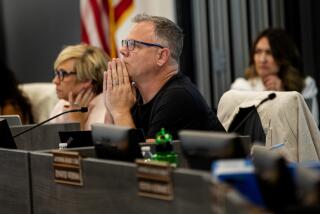Nebraska’s Voters Often Reckless With Recalls
- Share via
TAMORA, Neb. — Jesse Spidell cast a disgusted glance at the mound of tree branches piled up in front of his house.
Three years ago the Tamora village board would have had the mess carted away. The problem is, the village board is no more. It is one more victim of a recall, Nebraska’s weapon of choice for unseating unpopular elected officials.
The recall option exists in various forms all over the United States, but Nebraskans seem to have made it an art form. Soured on the mayor? Start a recall petition. Village board member shot your dog? Recall.
In Tamora, the troubles were rooted in a feud between the village board president and his father, who didn’t like the way he was running the town. The fight led to so many recall petitions that eventually Tamora people voted 30-6 to dissolve the tiny farming community altogether. In 1997 Tamora was officially unincorporated and fell under the rule of the county.
“It was kind of ridiculous,” Spidell said on a recent chilly morning, standing outside his house surrounded by fields of soybeans and milo. “I’m glad it ain’t my family.”
Nebraska does not allow for recalls of lawmakers or statewide elected officials like the governor and attorney general. But if you’re lower down the ladder--school board member, village treasurer, town clerk--watch out.
“I think there is a kind of latent gene in Nebraska citizenry that responds to this kind of contrary approach to public affairs,” said University of Nebraska political science professor Robert Sittig.
Neal Erickson, assistant secretary of state for elections, said: “The way the law currently exists, you can recall somebody because you don’t like the color of socks they’re wearing.”
Thomas Dodson of Giltner, in east-central Nebraska, gathered 56 signatures and forced a recall vote of Angela Joyce, a village board member. The vote is set for Oct. 19, and a simple majority of the village’s 290 registered voters will be enough to unseat Joyce.
She’s frustrated, not least because Dodson’s reasons are vague. “She more or less likes to do things her way and no one else’s,” he said to reporters, “and that doesn’t settle well with people here.”
“I can see if I had done something wrong, but I haven’t done anything,” Joyce said. “I can’t really campaign because I have no idea what I have done.”
In Roca, population 84, village board member Jeff Manske shot his neighbor’s dog to death because its barking irritated him. Three months later, residents voted 34-32 to oust him.
In Omaha, Nebraska’s largest city, warehouse worker Stephen King launched a recall petition last year against Mayor Hal Daub, mainly over his handling of police-related matters.
King accused Daub of “blatant arrogance” but failed to gather the necessary 40,000 signatures--35% of the number of votes cast in the mayoral election.
The move was not unprecedented; in 1987 Omaha Mayor Mike Boyle was recalled because of his controversial management style, including his firing of the police chief.
The power of recall can be invoked too quickly, Sittig said.
“They trot it out in the second or third inning of a pretty hotly contested fray when maybe it should be reserved for the eighth or ninth inning,” Sittig said.
The recall law was pushed through by reformers in the Plains states at the turn of the century, when farmers were facing economic hardship and there were fears that individuals’ rights would be trampled by railroads and banks, Sittig said.
The reformers felt that big business had too much of a voice in state and local government, he said.
The populist spirit has kept the law on the books relatively unchanged, and there are about a dozen recall efforts a year. But the latest have prompted suggestions that the law be revisited.
A proposal was introduced in the Nebraska Legislature last session to restrict recall petitions to cases of elected officials who have poor attendance records, neglect their duties or commit illegal acts.
The proposal was lambasted by at least one Nebraska newspaper. The Hastings Tribune called it the “Politicians Protection Act of 1999” and an “attempt to subvert Nebraskans’ right to participate in their governance.”
Even though some recall efforts may look silly, most are launched because of legitimate concerns, said Erickson of the secretary of state’s office.
Gary Krumland of the League of Nebraska Municipalities complains that too many recall drives seem like personal vendettas.
“People can start recall petitions for any reason,” Krumland said. “It interferes with officials carrying on their business.”
There is no village business in Tamora anymore.
A rusting flagpole sits unused outside the Tamora Town Hall, which has been sold and turned into a storage shed and junkyard. A derelict 1944 Chevy truck sits next to the village board’s former headquarters.
Tamora is now governed from Seward, the county seat six miles away. Is it governed any better? Spidell says he phoned the garbage-removal people in Seward about the branches three months ago. He’s still waiting.
More to Read
Sign up for Essential California
The most important California stories and recommendations in your inbox every morning.
You may occasionally receive promotional content from the Los Angeles Times.












